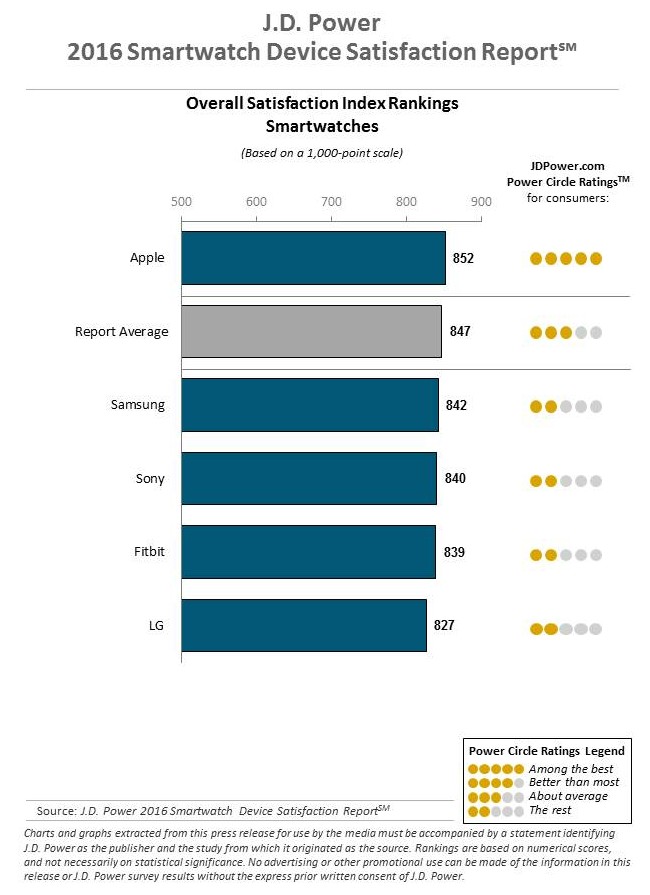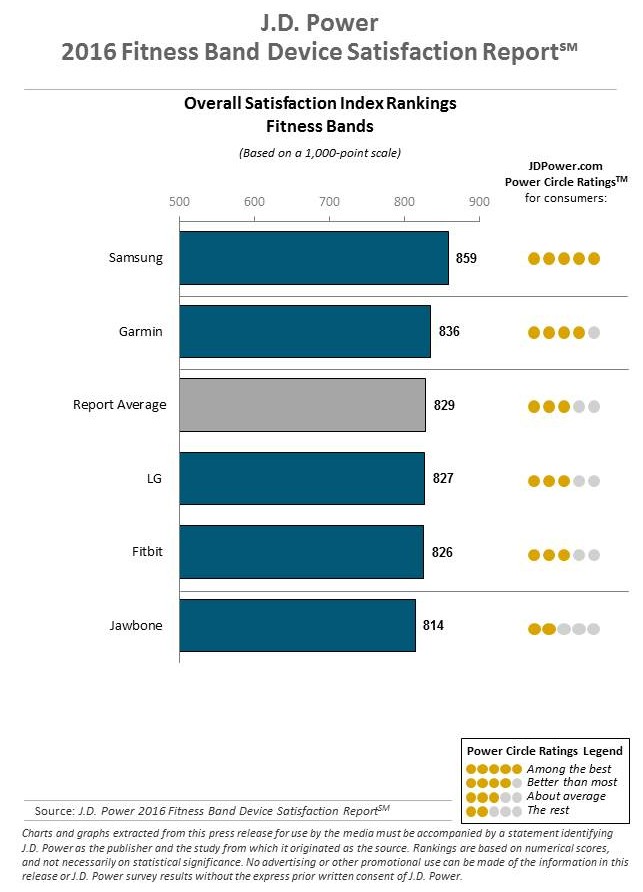The future belongs to the wearables but it would be worth noting that how the smartwatches and fitness bands have fared with the customers so far. A survey by J.D Power 2016 reveals the satisfaction quotient of the customers regarding the smartwatches and fitness bands.
The notable point here is that Apple’s smartwatch received much of the positive responses regarding the satisfaction quotient from its users and undoubtedly it deserves the numero uno position in smartwatch category. On the other hand, Samsung leads the way in terms of satisfaction quotient of its users in fitness band segment.
The survey includes the customers who bought the smartwatch or the fitness band within the past 12 months or so and the parameters were “listed in order of importance” – reliability, strength/durability, ease of use, battery life” etc. The points are provided on a 1000 point scale.
Smartwatch satisfaction index
Apple leads the smartwatch satisfaction category with 852 points mostly in terms of comfort, styling/appearance and ease of use. Samsung is ranked second in smartwatch satisfaction category in terms of display size, customer service and phone features. Taking into account all the other brands of the smartwatch, the average customer satisfaction lies at 847 points.
A considerable 19% of the customers admitted facing one or more issues in their smartwatch. The battery problem was the most common issue reported by 29% customers while 23% blamed for customising problems. Surprisingly broken charger also emerged as one of the most common issues as 22% customers reported about it.
Fitness bands satisfaction index
The Korean electronics giant, Samsung holds the topmost position in the fitness bands satisfaction segment with 859 points primarily due to its reliability, comfort and ease of use, whereas Garmin ranked second with 836 points. Taking into account all the other brands of fitness bands, the average customer satisfaction lies at 829 points.
The parameters over which customer chose their fitness bands were brand reputation (38%), positive reviews (36%), ease of use (48%) and tagged price (40%). The major sources of information used when selecting the fitness bands were friends and family (41%) and online shopping websites (43%).
“Both the wearable fitness tracking device and smartwatch marketplaces are evolving as more and more brands are offering updated devices with new features and services,” said Kirk Parsons, senior director and telecom, media & technology practice leader at J.D. Power.
Smartwatch Market: it’s All About Apple
Undoubtedly, the satisfaction quotient among the customers is the highest when it comes to Apple’s smartwatch. Apple watch overshadowed its competitors in 2015 claiming 52% share of the total global smartwatch shipments. Interestingly, the upcoming Apple watch 2 is promised to house some of the cutting-edge features like incorporating FaceTime camera in the watch, making the market more competitive for other players.
According to the report from Strategy Analytics, in Q1 2016 Apple smartwatch held an overall global market share of 52.4% in smartwatch category whereas its competitor Samsung could manage a meagre 14.3% of the total global smartwatch market. Thus one can decipher the huge gap between Apple and Samsung when it comes to smartwatch market. With 223% YoY growth in Q1 2016, the smartwatch industry has huge market potential in the wearable category. By 2019, the smartwatch will garner a whopping $17.5 billion in revenues.
Fitness Brand Market: Samsung vs Fitbit
Though Samsung leads the way in the customer satisfaction index, Fitbit accounts for the lion’s share in the fitness wearable category as the company sold a considerable 21 million units of its fitness trackers in 2015 alone registering a 90.9% YoY growth from 2014. Xiaomi captured the 2nd position with 12 million units of fitness tracker shipments in 2015.
Some of you may be wondering why are the fitness bands more successful than smartwatches despite the latter offering many more features and functionalities! The answer lies in Price. On an average, a smartwatch is tagged with $300 which is quite expensive considering customers see it as an additional accessory for a smartphone. On the other hand, a fitness tracker is much cheaper and costs around $100, making it much more affordable. Battery life is the another important factor behind its massive popularity than a smartwatch. The battery in fitness trackers lasts considerably longer than smartwatches.
Wearable market
For sure, the numbers of wearable devices in the market will rise as the wearable market is booming in the current scenario. Wearable Devices market is estimated to touch $28.7 billion mark by the end of 2016. A chunk of the revenue, around $11.5 billion, is slated to be catered by the smartwatches and fitness bands. However, many other research firms look more bullish about the growth of wearable devices market, Gartner estimates that the sales figures of wearable devices will zoom up to around 322.69 million units by 2017, up by 39% from 232.01 million in 2015.



